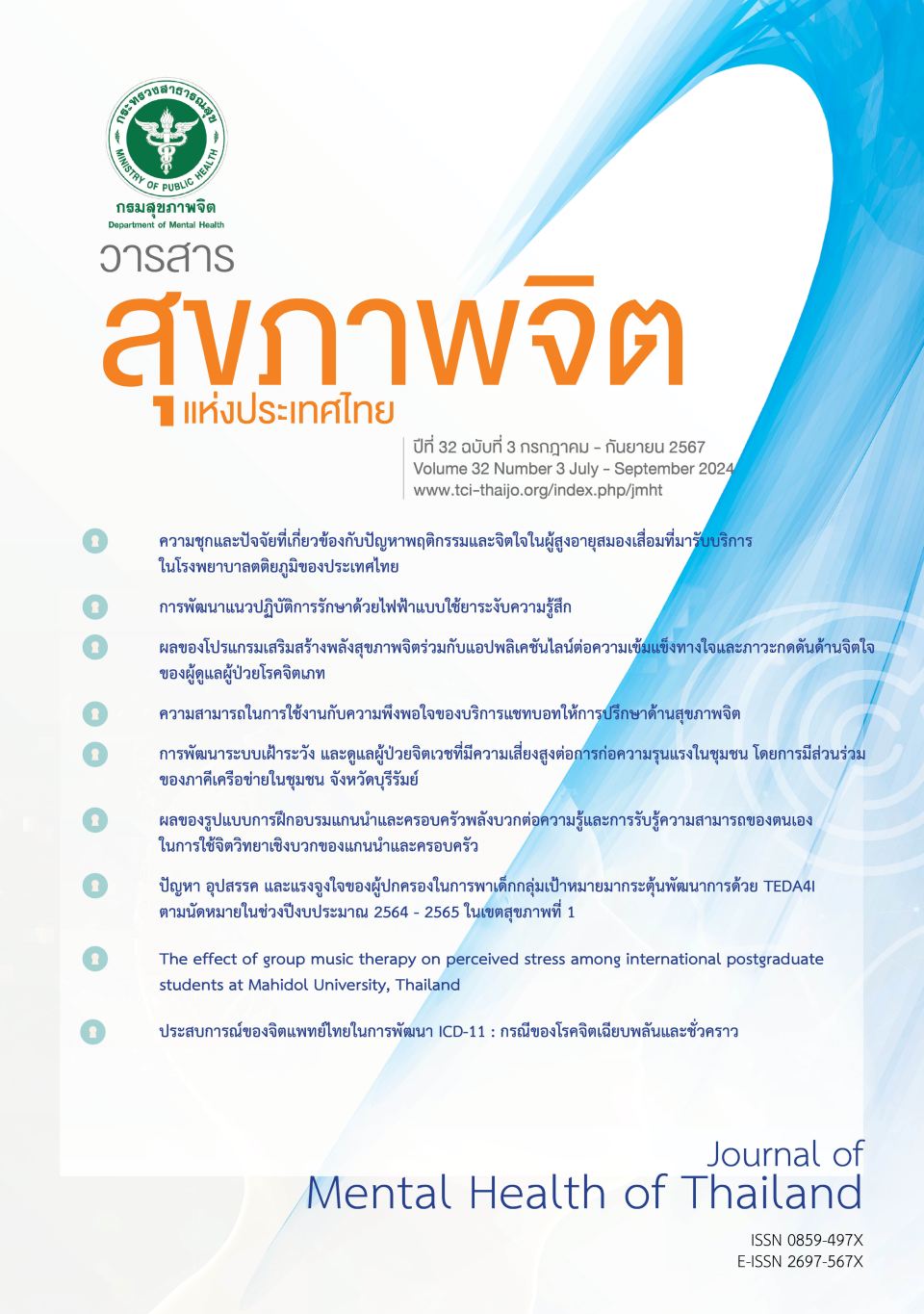ปัญหา อุปสรรค และแรงจูงใจของผู้ปกครองในการพาเด็กกลุ่มเป้าหมายมากระตุ้นพัฒนาการด้วย TEDA4I ตามนัดหมายในช่วงปีงบประมาณ 2564 - 2565 ในเขตสุขภาพที่ 1
คำสำคัญ:
เด็กปฐมวัย, พัฒนาการล่าช้า, การกระตุ้นพัฒนาการ, TEDA4Iบทคัดย่อ
วัตถุประสงค์ : เพื่อสำรวจปัญหา อุปสรรค และแรงจูงใจที่ทำให้ผู้ปกครองพาหรือไม่พาเด็กวัยแรกเกิดถึง 5 ปีกลุ่มเป้าหมายมารับบริการกระตุ้นพัฒนาการด้วยคู่มือประเมินเพื่อช่วยเหลือเด็กปฐมวัยที่มีปัญหาพัฒนาการ (Thai early developmental assessment for intervention: TEDA4I) ในปีงบประมาณ 2564 - 2565 ตามนัดหมาย
วิธีการ : การวิจัยแบบผสานวิธีในเขตสุขภาพที่ 1 ด้วยการศึกษาย้อนหลังจาก health data center เพื่อระบุผลการประเมินพัฒนาการและสถานะการติดตาม ร่วมกับการสัมภาษณ์ผู้ปกครองของเด็กกลุ่มเป้าหมายทางโทรศัพท์เพื่อสอบถามปัญหา อุปสรรค และแรงจูงใจในการพาเด็กมารับการกระตุ้นพัฒนาการตามนัดหมาย วิเคราะห์ข้อมูลด้วยสถิติเชิงพรรณนา การทดสอบ chi-square และการทดสอบ Wilcoxon rank-sum
ผล : กลุ่มตัวอย่าง 1,061 คน เป็นหญิงร้อยละ 81.0 อายุ 21 - 59 ปีร้อยละ 87.9 เด็กเป็นชายร้อยละ 67.9 และมีพัฒนาการล่าช้าอย่างน้อย 1 ด้านร้อยละ 76.7 ปัจจัยที่มีความสัมพันธ์กับการพาเด็กมากระตุ้นพัฒนาการด้วย TEDA4I ได้แก่ เพศ อายุ และผลการประเมินพัฒนาการของเด็ก และระยะทางในการเดินทาง พบว่าร้อยละ 43.6 ของกลุ่มตัวอย่างระบุว่าไม่สามารถพาเด็กมากระตุ้นพัฒนาการตามนัดหมาย โดยให้เหตุผลว่าไม่มีเวลา มีปัญหาค่าใช้จ่าย และมีปัญหาการเดินทาง และในกลุ่มนี้ร้อยละ 23.8 ไม่ประสงค์นำเด็กกลับเข้าสู่ระบบเนื่องจากไม่มีเวลาและคิดว่าไม่จำเป็น ขณะที่กลุ่มที่พาเด็กมากระตุ้นพัฒนาการตามนัดหมายให้เหตุผลว่าเด็กยังมีพัฒนาการล่าช้าหรือมีพัฒนาการดีขึ้นจากการกระตุ้นครั้งล่าสุด
สรุป : ปัญหาการเดินทาง ค่าใช้จ่าย และทัศนคติของผู้ปกครองมีผลต่อการได้รับการกระตุ้นพัฒนาการของเด็ก ควรมีการพัฒนาระบบเฝ้าระวังและติดตามตั้งแต่เด็กได้รับการประเมินพัฒนาการครั้งแรก เพิ่มช่องทางออนไลน์ในการเข้าถึงบริการและการติดตาม และส่งเสริมความตระหนักรู้ถึงความสำคัญของการส่งเสริมพัฒนาการเด็ก
Downloads
เอกสารอ้างอิง
Ministry of Education. Early childhood education manual 2003 (for children aged 3-5 years). Bangkok: Kurusapa Printing Ladphrao; 2003. (in Thai)
Likhar A, Baghel P, Patil M. Early childhood development and social determinants. Cureus. 2022;14(9):e29500. doi:10.7759/cureus.29500.
Losatiankit P, Kangkan W, Pupongpunkul K, Phanpong C, Saenjai M, Prasith-thimet T, et al. Situation of Thai Childhood Development in 2014. Journal of Health Science of Thailand. 2017;26(2):S199-208. (in Thai)
Khamkan W. Effects of TEDA4I Program on Children 0-5 Years withDelayed Development in Lamphun Hospital. Journal of the Phrae Hospital. 2023;31(1):16-26. (in Thai)
Choo YY, Agarwal P, How CH, Yeleswarapu SP. Developmental delay: identification and management at primary care level. Singapore Med J. 2019;60(3):119-23. doi:10.11622/smedj.2019025.
Sondee S, Phetcharak K, Tewasekson N, Jantarasuk C, Polchamratpat R, Soutmun N. The relationship between perception of development promotion behaviors and parenting behavior to promote child development from newborn to five years. Medical Journal of Srisaket Surin Buriram Hospital. 2023;38(1):153-61. (in Thai)
Ratnan Y. Study of factors affecting Thai early childhood development, Health Region 8. Nonthaburi: Bureau of Health Promotion, Department of Health, Ministry of Public Health; 2016. (in Thai)
Jaimao P. Factors affecting parental behaviors on promoting early childhood development, Li district, Lamphun province [master’s thesis]. Phitsanulok: Naresuan University; 2022. (in Thai)
Salinpramote B. Quality of life among caregivers of children with developmental delay. Research and Development Health System Journal. 2022;15(3):114-127. (in Thai)
Morrison J, Chunsuwan I, Bunnag P, Gronholm PC, Lockwood Estrin G. Thailand’s national universal developmental screening programme for young children: action research for improved follow-up. BMJ Glob Health. 2018;3(1):e000589. doi:10.1136/bmjgh-2017-000589.
Sutthithumthaworn A. Effectiveness of developmental promotion model for children with development delay. Reginal Health Promotion Center 9 Journal. 2022;16(3):986-991. (in Thai)
Chaichanasang T, Posri A, Tangtumpitak T. The family participation in child development stimulation and promotion at child development center. Journal of Nursing Science & Health. 2018;41(1):95-104. (in Thai)
Ministry of Public Health. Developmental Surveillance and Promotion Manual (DSPM). Nonthaburi: Office of Printing Affairs of the War Veterans Organization; 2023. (in Thai)
Ministry of Public Health. Access to the mental health service system [Internet]. Nonthaburi: Ministry of Public Health; 2024 [cited 2024 June 27]. Available from https://hdcservice.moph.go.th/hdc/reports/page.php?cat_id=ea11bc4bbf333b78e6f53a26f7ab6c89 (in Thai)
Department of Mental Health, Ministry of Public Health. Thai Early Developmental Assessment for Intervention: TEDA4I. Nonthaburi: The Agricultural Co-operative Federation of Thailand; 2015. (in Thai)
Jarungjittanuson S. Development of surveillance and promotion model for early childhood with developmental delay in Buriram province. Journal of Nursing and Health Care. 2017;35(2):122-32. (in Thai)
Thaineua V, Sirithongthaworn S, Kanshana S, Isaranurak S, Karnkawinpong O, Benjaponpitak A, et al. A 9-year retrospective cohort study of the monitoring and screening of childhood developmental delay in Thailand. Child Care Health Dev. 2024;50(2):e13233. doi:10.1111/cch.13233.
Patombovorntat R. The factors related to caregivers to take the early childhood for screening of child development [master’s thesis]. Chiang Mai: Chiang Mai University; 2019. (in Thai)
Sungsakul W, Meenongwah J. Perception of parents of children with suspected developmental delays regarding an access to services for the promotion of early childhood development in 10th public health region. Journal of Health and Nursing Education. 2022;28(1):e257846. (in Thai)
ดาวน์โหลด
เผยแพร่แล้ว
รูปแบบการอ้างอิง
ฉบับ
ประเภทบทความ
สัญญาอนุญาต
ลิขสิทธิ์ (c) 2024 วารสารสุขภาพจิตแห่งประเทศไทย

อนุญาตภายใต้เงื่อนไข Creative Commons Attribution-NonCommercial-NoDerivatives 4.0 International License.
- ผู้อ่านสามารถนำข้อความ ข้อมูล จากวารสารไปใช้ไปใช้ประโยชน์ทางวิชาการได้ เช่น เพื่อการสอน เพื่อการอ้างอิง แต่การนำไปใช้เพื่อวัตถุประสงค์อื่น เช่น เพื่อการค้า จะต้องได้รับอนุญาตเป็นลายลักษณ์อักษรจากกรมสุขภาพจิตก่อน
- ความคิดเห็น ข้อมูล และบทสรุปต่าง ๆ ที่ลงตีพิมพ์ในวารสารสุขภาพจิตแห่งประเทศไทยเป็นของผู้เขียนบทความและมิได้แสดงว่ากองบรรณาธิการหรือกรมสุขภาพจิตเห็นพ้องด้วย




